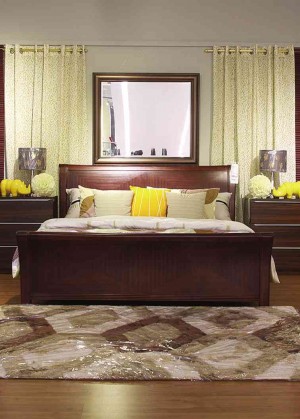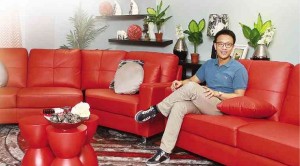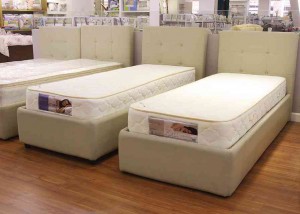Why Mandaue Foam buys, rather than rents, space
If you’re furnishing a one-bedroom condominium unit on a budget, a furniture company can provide the elements for less than P60,000.
That’s one of the sales tacks of Mandaue Foam Philippines, a Cebuano company that has evolved from producing foam slabs to lifestyle furniture.
It recently opened the Mandaue Foam Furniture Center along Shaw Boulevard, Mandaluyong. Named after the family matriarch, Rosita Uy, the three-level building offers everything from beds, curtain materials, accessories, living and dining room sets, storage, outdoor furniture and office furniture.
The company produces 60 percent of its furniture while the products made with MDF (medium-density fiber board) metal and plastics are sourced from Southeast Asia. The center has seasonal collections and even offers interior design services.
Mandaue Foam Philippines has been in the country’s Top 1000 Corporations for the past five years. In 2012, it was ranked at No. 773. The company owns six factories and 20 showroom stores with a workforce of over 3,500.
Some 30 percent of its business comes from wholesale of foam slabs to upholsterers and furniture makers such as Dedon, Kenneth Cobonpue and beds to the Ayala Hotels like Seda and Robinsons Land Corporations’ Go Hotels. Majority of the business comes from retail, targeting the wider B and C markets in key cities around the country.
Backyard operation
There’s the oft-repeated story of how widow Rosita Uy set up a trading company in Cebu which sold everything from foods to furniture, one of the most salable product was the foam slab. An entrepreneur at heart, her son, Robin, wanted to put up a unique business. His mother suggested selling foam slabs.
To cut down costs of importing from Manila, Robin produced his own foam with his friends in the backyard. In 1971, the company started its business in Mandaue City, Cebu with Robin as the president.

MAHOGANY bed frame with sapelle veneer is one of Mandaue Foam Philippines’ famous products. Photo by NELSON MATAWARAN
Eventually the product line expanded to beds, sofas, and chairs. As Mandaue Foam Philippines started specializing in mahogany frames for the furniture, it evolved into selling lifestyle concepts.
Ryan Robinson Uy, AVP Operations and the eldest of Robin’s three children, explains that in the beginning, the store window displays focused on the core products—the spring mattresses and beds.
With the basic furniture pieces and a few accessories, the father changed the visual merchandising into a complete bedroom or living room setting. When customers started asking about the vases and figurines on display, Robin started stocking up on accessories.
Today, plates, towels, figurines and other gewgaws from China, Malaysia and Indonesia are very salable at the showroom. The top sellers are the beds, naturally, which can cost anything from P6,000 for a single bed mattress to P11,000 for a king-size orthopedic mattress.
The younger Uy explains, “Our company philosophy is that you don’t need to spend much money to have a nice home. Customers say, ‘Your stuff are well priced compared to the mall.’”
Brand visibility
The advantage of their family-owned standalone store is that customers buy directly from the manufacturers. “There is no person in-between. We base our prices on all our savings so that the customer can get value for money,” says Uy.
The family doesn’t have to pay rent since it owns the lot and building in all its locations. They don’t hire celebrity endorsers and they keep their advertising costs low.
“There is no need for gimmick. Some businesses will double the price and sell the item at 50 percent off. People will think it’s a bargain. They don’t know that the price was doubled in the first place. What you find in our store is competitively priced.”
As in any mall-based business, the huge rent, maintenance, utilities and security, advertising and promotions are all factored in the price tag. Thus, the products come out 70 to 80 percent more expensive.
One advantage of owning the property is that the owners have an idea of their yearly costs. In a mall, Uy says lessees are subject to vagaries such as increases in rent, electricity and mall sales and promos which can consume their profits.
On the other hand, the mall provides brand visibility. “There’s a high volume of traffic. People can get to know your brand when they see your products in the malls,” he says.
Mandaue Foam has a few concessionaire pieces in some department store malls which are not sold in their own stores. “Concessionaire rates are high in department stores. Our profit margins are modest. We are only able to break even because the competition is stiff,” says Uy.
The family business has been flourishing by word-of-mouth and customer goodwill. Uy projects a modest 10 percent growth every year since their family makes a large upfront investment on the lot and building every time they open a store. Its strategy has been to expand in emerging markets in the Visayas and Mindanao before Luzon.
The Butuan City branch, which opened in 2005, tops all the stores in sales performance. “There’s very little need for marketing. We’re the only furniture store there,” says Uy.
Entering the densely populated and highly competitive market in Luzon came later. When Uy would make sales calls in the provinces, the people would refer to the foam slabs and mattresses with another brand.
Nonetheless, the family first built a factory and showroom in Cainta before putting up the stores in Las Piñas, Quezon City, Lipa, Batangas, and Mandaluyong City.
This year Mandaue Foam Philippines will open stores in Tagbilaran City, Bohol and Iligan City, Lanao del Norte.
“Our goal is to help the Philippine economy and give opportunities to many people,” says Uy.
He says the siblings were exposed to the business since childhood. At six years old, the younger Uy would be packing pillows.
Since Mandaue Foam had other businesses such as packing bananas in Davao, the children would go with their father to the plantations and put bananas in plastic to earn some allowance in summer.
After graduating from Ateneo, majoring in business management, Uy worked in the company’s sales and marketing and eventually the wholesale business and operations. His mother, Evelyn, takes care of the finances while his sister Erlyn Uy-Ho handles merchandising. His brother, Rodney is developing the kitchen line which will be launched this year.
The business moves forward under the vision of the father who still credits the late matriarch, Rosita, for being the model of hard work.


